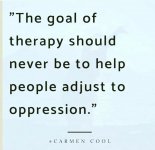"There are substantial differences in therapists’ performance. Fortunately, most therapists produce results comparable to what we would expect from well-conducted clinical trials."
- Society for the Advancement of Psychotherapy
- Society for the Advancement of Psychotherapy

